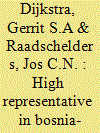| Srl | Item |
| 1 |
ID:
186387


|
|
|
|
|
| Summary/Abstract |
Given the pace of contemporary events, this brief commentary is intended as an addendum and recent update to our original research article that is also published in this issue of World Affairs (vol. 185, no. 2) entitled “The High Representative in Bosnia-Herzegovina: The Unusual Institutional Arrangement of a Non-Authoritarian, yet Controlled, Democracy” (see Dijkstra and Raadschelders 2022). We focus here on Russia's role in Bosnia and raise some tentative questions that are likely to remain extremely important for world affairs in the Balkans and beyond over the coming months. This commentary was submitted to World Affairs Journal some days before the Russian invasion of Ukraine on February 24, 2022. Given the extreme unpredictability of the situation regarding Ukraine and Russia, we elected not to provide substantive updates since late February 2022.
|
|
|
|
|
|
|
|
|
|
|
|
|
|
|
|
| 2 |
ID:
186386


|
|
|
|
|
| Summary/Abstract |
How difficult it is to introduce democratic institutional arrangements in a territory that had mainly experience with authoritarian government is illustrated by the case of Bosnia-Herzegovina (BH). The Dayton Peace Accord of 1995 established the (Office of the) High Representative (OHR) to help the new republic of BH develop into a democracy. After more than 25 years, one cannot but conclude that the creation of democratic institutions has not worked for lack of collaboration between the three most important ethnic groups. At best, BH is a controlled democracy, held together by OHR. The development of this office is analyzed in terms of a neo-institutional framework. We argue that the republic survives so far on the basis of negative legitimacy (accepting the OHR as the binding institutional arrangement). This also suggests that neither developments in a past long gone nor more recent developments (i.e., ‘strong’ path-dependency) prohibit a development toward positive legitimacy (i.e., ‘lean’ path-dependency). The case of BH also illustrates that democracy is hard, if not impossible, to establish when people are internally divided and where (some) domestic and international actors exploit these divisions in the international arena.
|
|
|
|
|
|
|
|
|
|
|
|
|
|
|
|